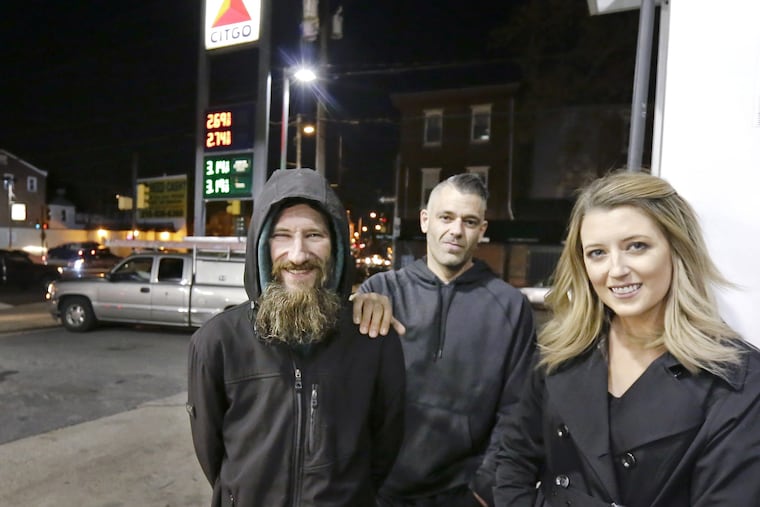Johnny Bobbitt’s story is a reminder that even winning the lottery won’t beat stigma | Opinion
McClure and D'Amico had no interest in helping Bobbitt — they wanted to fix him

On an October night in 2017, around 11p.m., 27-year-old Kate McClure was driving into Philadelphia on I-95 from New Jersey when her car ran out of gas. She didn't have any cash. Lucky for her, Johnny Bobbitt, a homeless man sitting next to the I-95 exit, used his last $20 to help her.
This could have been a vignette about kindness but what happened next is an ugly reminder that in America, everyone has the right to make choices with their money except for the poor and people in addiction.
In gratitude, McClure and her boyfriend, Mark D'Amico, 37, at the time, launched a GoFundMe page to help Bobbitt. The story went viral and the page raised more than $400,000. McClure spoke to Good Morning America and other outlets, explaining that she would consult with a lawyer and a financial adviser about the best ways for Bobbitt to use the money.
Spending money wisely is not usually a prerequisite in GoFundMe campaigns. For example, the campaign for Prashanth Raju, a man who was critically injured in a car accident in Delaware, has already raised more than $184,000 and states clearly that, "All the funds are going directly to Prashanth Raju's bank account for him to use."
Meanwhile, Bobbitt's money is managed by relative strangers.
The couple said that they would open two trusts in Bobbitt's name and give him an allowance, as if he were a child. Instead of getting a home, which was Bobbitt's top priority, he found himself living in a camper on the couple's property in Burlington County. Instead of getting his dream car — a 1999 Ford Ranger — he was given a used SUV that broke down. Both vehicles were registered in McClure's name so that he couldn't sell them.
What's aggravating here is that Bobbitt was trusted completely with his money when it was time to help McClure with his last $20. But, when the money was to be used for his own benefit, people decided he couldn't be trusted and should be told how and when to spend the cash. D'Amico told the Inquirer that giving a person in addiction the money would be like "giving him a loaded gun."
Less than a year later, Bobbitt is back on the streets and using drugs. (GoFundMe is investigating possible misuse of funds — but, for the sake of this conversation, let's put all that aside and assume that McClure and D'Amico acted with only the purest intentions.)
The idea that poor people can't, or shouldn't, handle their own money — especially if it came from a benefactor — is on brand for America.
Every year, there is a discussion about restricting food stamps to only pay for healthy foods and requiring people who receive food stamps to pass drug tests. God forbid a poor person will enjoy a cold Coke — like millions of Americans every day — or that people who use drugs won't go hungry.
One counter-argument is that affluent people indulge — drink, eat unhealthy food, gamble — using their own money while poor people use taxpayers' money, hence it is justifiable to limit its use to necessities. But rich people get money from the government all the time. Just look at the subsidies to homeowners. Every year $134 billion of tax money goes to homeowners — the majority to rich people who own multiple, expensive houses. That's more than the total budget of food stamps, low-income housing tax credits, housing vouchers, and emergency cash assistance combined.
Unlike programs that benefit the poor, programs that benefit the rich don't come with any strings attached — no restriction on how the money can be used or politicians calling for homeowners to be drug tested to get the benefit.
But Bobbitt is not only poor, he is also a person in addiction. What if he used the money that people donated to buy drugs?
Short answer: That's none of your business. People spend money in ways that some might disapprove of all the time. Holier-than-thou D'Amico even admits that he "borrowed" some of the donated money to gamble at SugarHouse casino.
The longer answer is that for addiction treatment to succeed, a person needs to be ready for treatment — mentally, emotionally, socially — and treatment needs to be readily accessible (which is hardly the case in the Philadelphia area). Forcing people into treatment is a recipe for failure. But perhaps the key for recovery is recognizing the relapsing nature of addiction. Recovery and treatment is not "one-and-done," but a process with steps forward and backward.
McClure and D'Amico called their GoFundMe page "paying it forward." The only thing that was paid forward is paternalism and stigma. Instead of creating a compassionate environment for Bobbitt's journey in recovery, his relapses became news. Imagine struggling through recovery, relapsing, and then feeling that you are disappointing thousands of people.
On Good Morning America, Bobbitt said he felt as if he had won the lottery. But, as Bobbitt's story shows, if you are poor and in addiction, even winning the lottery is not enough.
Philadelphia Media Network is one of 19 news organizations producing Broke in Philly, a collaborative reporting project on solutions to poverty and the city's push towards economic justice. See all of our reporting at https://brokeinphilly.org